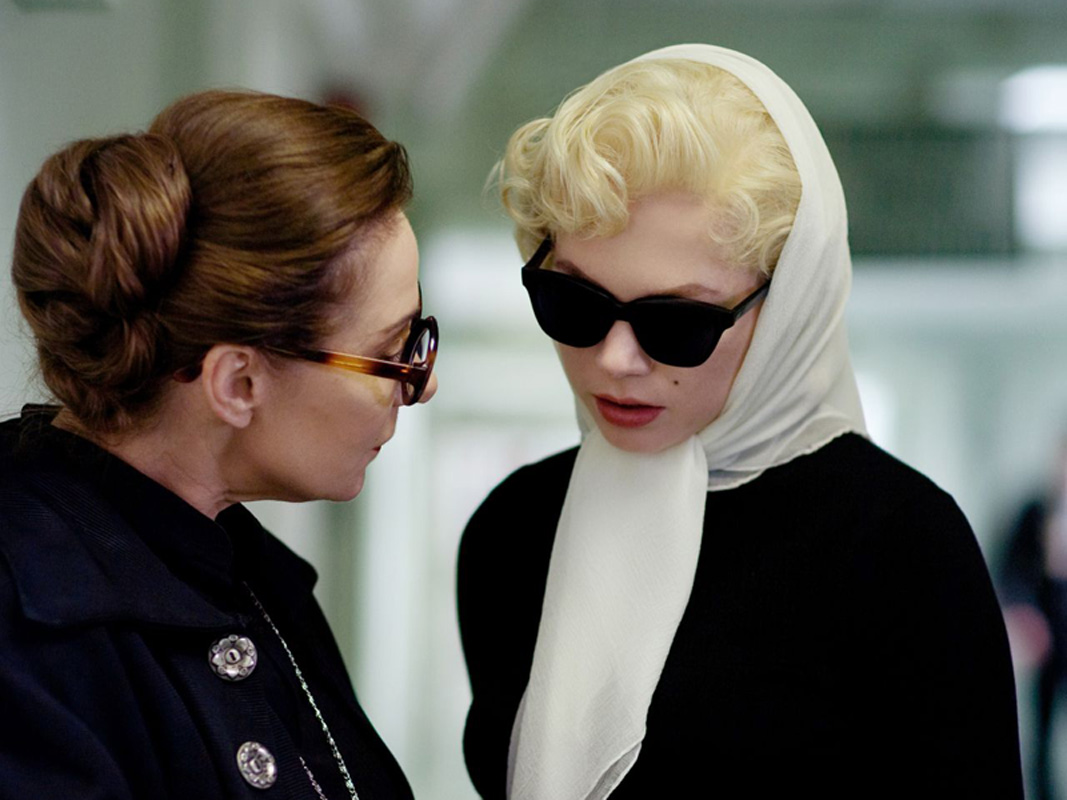Listen carefully, I will not repeat this: My Week With Marilyn is a slight and charming tale well told, well acted and like many before it, flawed… but very enjoyable nonetheless. It follows the alleged brief relationship between poor little rich boy Colin Clark and Marilyn Monroe during her time in England making The Prince and the Showgirl with Sir Lawrence Olivier. Like Salieri’s story in Amadeus, you may take Clark’s naive account with a pinch of salt, but whatever embroidery has been added, it makes for a very watchable story, aided by a fine cast, good script, and excellent recreation of 1950s Britain.
To give Michelle Williams her due, she impersonates Marilyn to nigh on perfection (which, given the fact that every actress of a certain age does a dodgy Marilyn impersonation, is worthy of note), but attempts to get under the skin of a character known to be complex, flaky but with hidden reserves of resilience when called upon. Her biggest problem, if you believe this version, were her assorted hangers-on and the pills for every occasion.
Branagh’s Olivier, while worshipping the poor dear, gives her short shrift with his direction hat on, barking tersely about her failings at every opportunity (“teaching Marilyn to act is like teaching Urdu to a badger!”) In the final analysis, his adoration wins out, though Clark himself (Eddie Redmayne) is given the task of suggesting that Olivier is a great actor who wants to be a movie star, while Monroe is a movie star who wants to be a great actress, and never the twain… Credit also to Branagh that he steals the acting honours, though being given the chance to play your hero is more like giving the keys of the sweet shop to an 8-year old.
The supporting cast also do well. Nice to see Emma Watson beyond Hermione in Harry Potter, for example. The regular cast of British character actors do a fine job – where would we be without the likes of Jim Carter?! A smattering of other well-known faces, including Dougray Scott, Zoe Wanamaker, Toby Jones (fast becoming the ubiquitous all-purpose short ugly bloke with a permanent sneer), Judi Dench as Dame Sybil (another plum job), Julia Ormond, Derek Jacobi, Uncle Tom Cobley and all.
Ah, but you want to know about the flaw? Well, since this is a very personal thing you are at liberty to disagree, but it’s become a cliche in the movie business, even when the movies are “based on” real-life incidents, that characters fall in love instantly. For the business of film it has to be more rapid than in real life, but my contention is that attraction is instant but true love depends on getting to know someone over a period, and that anyone who says they love someone on short acquaintance is either lying or, as in this case, is in love with the idea of the person rather than the reality.
The movie paints Clark being in love with the touching reality of Marilyn, despite her being on her third husband by 30 and clearly out of sorts in many ways but putting on a brave face for at least some of the time. I think her was probably in love with her iconic status long before he met her, but the woman herself under the glorious exterior was not someone you could fall for quickly, unless you go for needy and vulnerable types.
Here, the relationship is confined to a week and the 95 minutes of this movie, so when Marilyn asks Colin if he loves her, he says yes. A chaste love, so it would appear, not least because she is married to Arthur Miller, who has left her there and gone home in despair. I have no doubt Clark worshipped Monroe too, distracting him from very lovely wardrobe mistress Lucy (Watson).
Marilyn takes a shine to young Colin, and under his influence makes it to the set more or less on time and completes the movie brilliantly, in contrast to her early attempts. Judge for yourself whether she did well, though whether that was the result of Clark’s efforts, Olivier’s direction, faith healer and alleged acting coach Paula Strasberg (Wanamaker), Svengali-like manager/minder/business partner Milton Greene – actually a photographer (Dominic Cooper), or her own efforts in dragging herself up by the bootlaces to meet the challenge, is open to interpretation. For these purposes and for Clark’s vanity, it is romantic to think Monroe did respond to his wooing.
Clark eventually became a film-maker in his own right (mostly documentaries) and wrote two books about the time in question, while Monroe went on to become the stuff of legends. Maybe this is just another legend? Who knows, given that all the participants are now dead.
How successfully the film encapsulates the real Marilyn you can decide for yourself, but if you take it at face value as a light-hearted entertainment, A Week with Marilyn succeeds admirably. Enjoy!










